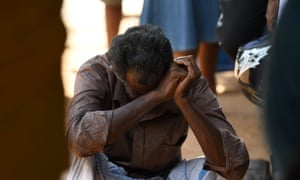Tasnim Nazeer - Sri Lanka’s Christians were left unprotected for far too long
My first reaction was panic. As I woke up to the horrific scenes from churches and hotels in Sri Lanka; to news of the dead, dying and injured, on a day of
Christian celebration, I desperately rang loved ones, checked on cousins,
uncles, aunts and friends. As further explosions occurred, and more deaths were
reported, my heart pounded. Finally, I learned that my relatives were all OK,
and I began to reflect on an atrocity that must not be allowed to divide Sri
Lankans and take us back to the darkest days of the recent past.

A man weeps outside a hospital in Batticaloa, Photo: Lakruwan Wanniarachchi/AFP/Getty Images
I was born in Britain to Sri Lankan parents and have a Sri Lankan husband. As a Muslim I know too well the feeling of shock and fear when someone has tried to harm you in a place of worship. I felt today as I felt when I woke to news of the attack on worshippers in Christchurch, New Zealand, which left 51 people killed and dozens injured. Those Muslims had gone to Friday prayers on Jummah, a holy day. Here in Britain many Muslims were fearful to go to their local mosques following that atrocity on the other side of the world. In the same way, many Christians will now be reluctant to go to church in places around the world where their communities have suffered hostility and intimidation. The fact that churches were targeted deliberately across Sri Lanka shows that this terrible, coordinated series of explosions was another attempt to instil fear among a religious minority.

A man weeps outside a hospital in Batticaloa, Photo: Lakruwan Wanniarachchi/AFP/Getty Images
I was born in Britain to Sri Lankan parents and have a Sri Lankan husband. As a Muslim I know too well the feeling of shock and fear when someone has tried to harm you in a place of worship. I felt today as I felt when I woke to news of the attack on worshippers in Christchurch, New Zealand, which left 51 people killed and dozens injured. Those Muslims had gone to Friday prayers on Jummah, a holy day. Here in Britain many Muslims were fearful to go to their local mosques following that atrocity on the other side of the world. In the same way, many Christians will now be reluctant to go to church in places around the world where their communities have suffered hostility and intimidation. The fact that churches were targeted deliberately across Sri Lanka shows that this terrible, coordinated series of explosions was another attempt to instil fear among a religious minority.
It is disturbing to
reflect that the warning signals have been there in terms of the treatment of
religious minorities. When I visited the country to report on anti-Muslim riots
that were happening in response to aggression and intimidation from the
extremist Buddhist nationalist group, Bodu Bala Sena, the tension and anxiety
among minorities was palpable. I came across flyers that targeted both Muslim
and Christian minority groups in Sri Lanka, who account for 17% of Sri Lankan’s
population. There were calls for a boycott of their shops. The president,
Maithripala Siresena had promised to investigate hate crimes against minority
groups after assuming power in 2015. Too little was done.
I have spoken to
witnesses of attacks on Muslims, who told me that police stood by as the
violence took place. Despite empty reassurances from the government, minority
groups have long felt unprotected. It was a scandal, for example, that it took
so long to press charges against the hardline Buddhist monk and
general-secretary of the BBS, Galagoda Aththe Gnanasara Thero. Gnanasara
was jailed
last year for intimidation. But the persecution of Sri Lanka’s
religious minorities continues.
Last year, a state of
emergency was declared after Muslim-owned shops and homes were burned down. And
there has been a significant increase in attacks against Christians according to
the National Christian Evangelical Alliance of Sri Lanka. Two weeks ago there
was an attack on a Methodist church in the northern town of Anuradhapura, which
further instilled fear in Christian communities across the country. The
Catholic bishop Asiri Perera has tried to get the government to focus on this
issue. After the Anuradhapura attack, he said: “The faithful are “heartbroken.
They have no place to pray, or celebrate the Easter Triduum. We all pray that
God may give them courage and keep them steadfast in the face of persecution.”... read more:
